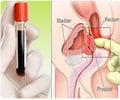Researchers find a common genetic link between molecular mechanisms in prostate cancer and Ewing's sarcoma.

- Prostate cancer affects men over 50 years of age and Ewing’s sarcoma affects children and young adults.
- A genetic link has been identified between prostate cancer and Ewing’s sarcoma.
- The proteins produces by EWS genes interact with proteins produced by the four ETS genes that cause prostate cancer.
- This interaction mechanism also helps in the development of common treatment strategies for both the conditions.
Ewing's sarcoma is a form of bone and soft tissue cancer that affects about one in 1 million children and young adults age 10 to 19. It is terminal in 44% of teens aged 15 to 19 years and 30% of children.
Over 100,000 men are diagnosed with prostate cancer each year in the U.S, with more than 99% of cases occurring after age 50.
"This research shows that the molecular mechanism involved in the development of most prostate cancers is very similar to the molecular mechanism known to cause Ewing's sarcoma," said Peter Hollenhorst, an associate professor in the medical sciences program at IU Bloomington, a part of the IU School of Medicine. "It also suggests that this mechanism might be used to explore a common treatment for both diseases, one of which is not often pursued by drug companies due to its rarity."
There are 28 genes in the human body known as ETS genes, four of which are known to produce proteins that cause prostate cancer.
Ewing's sarcoma results from errors in the chromosome repair process that causes the merger of two separate gene segments into a mutant hybrid gene, also known as a chimeric or fusion gene. One of these genes is called EWS, the other is a gene that produces ETS proteins.
The EWS protein only interacts with proteins from these four harmful ETS genes, not the other 24 ETS genes not found to play a role in prostate cancer.
"A molecular mechanism that sets these four genes apart from the ones that don't trigger cancer has never been identified until now," Hollenhorst said. "This is significant because it suggests that any compound that disrupts EWS-ETS interaction would specifically inhibit the function of the four oncogenes and not the others, which play important roles in the healthy function of the body."
IU scientists used a combination of laboratory experiments and mouse models to observe the interaction of EWS and ETS proteins in prostate cells.
In experiments at the IU School of Medicine, they also introduced the ERG gene into normal human prostate cells in mice, which triggered the formation of tumors.
The scientists then introduced an artificial mutation in the ERG gene to disrupt interaction with the proteins produced by the EWS gene. In these mice, the tumors failed to form.
"Together, the results indicated that the interaction between ERG and EWS is important for tumor formation," Hollenhorst said. "We chose to focus our greatest efforts on the ERG protein since it is responsible for over 50% of all prostate cancers, and therefore the potential to benefit the greatest number of people."
Source-Medindia















